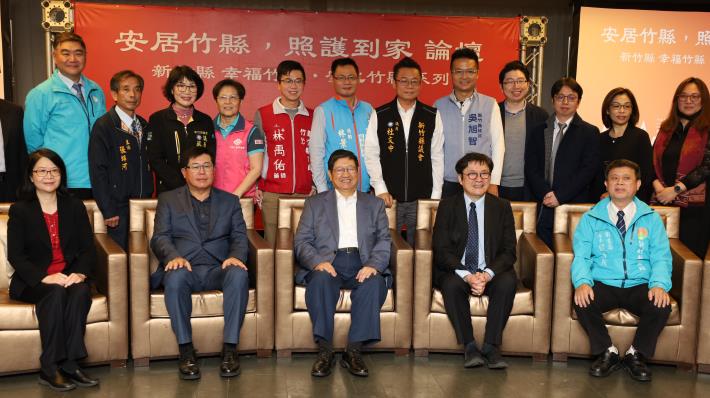
Having the heart of Taiwan’s science and technology--the Hsinchu Science Park, has allowed Zhubei City to quickly emerge and flourish. However, there are also rural areas within its jurisdiction, and the inevitable gap between urban and rural areas has resulted in the uneven distribution of medical resources. Hsinchu County Magistrate Yang Wen-ke hopes to introduce technology into medical care. Today (the 25th), industrial, government, academic and medical experts are invited to the "Hsinchu County In-place Home Care" forum. He hopes that through collaboration, medical services, care services and health services can penetrate communities and families throughout all the towns and villages.
Hsinchu County Magistrate Yang Wen-ke pointed out that Hsinchu County has been booming in recent years. Its population growth rate is the highest on the island. The population structure is young, with an average age of 39.63 years old, making it the second youngest city in the country. At the same time, Hsinchu County still has a relatively high proportion of elderly people in its villages and towns. Therefore, the core of policies remains “caring for all ages". The county government has obtained increasing funding each year for long-term care. Last year, it received over NT$500 million. Its social and health administration teams are devoted to establishing Long-term Care 2.0. Nevertheless, the demand for long-term care is still far greater than the supply, and more resources from the central government are still needed.
Yang Wen-ke hopes that after everyone has brainstormed and achieved a consensus at the forum, he can submit a "National Health Insurance Telemedicine Benefits" proposal to the central government. He hopes to receive budget support to enrich local medical resources, provide diversified and continuous care and improve the accessibility of medical care for the people. The proposal expects to integrate the latest technologies such as digital, video streaming and 5G technologies to achieve a consensus on care and provide patients with care options.
Experts from the Ministry of Health and Welfare Shuang Ho Hospital, China Medical University Hsinchu Hospital, National Taiwan University Hospital Hsin-Chu Branch, the Minsheng Group Digital Transformation Center, Real Masters of Health, Far EasTone Telecommunications, All Safe, Jotangi Technology and other smart medical care fields were invited to participate in the forum.
Tung-Cheng Yin, Director General of the Public Health Bureau of Hsinchu County Government explained that the gap between urban and rural areas and the uneven distribution of medical resources in Hsinchu County has resulted in gaps in medical and health indicators. Then experts from major hospitals shared their opinions and discussed other issues such as resource allocation structures and future trends in medical care. During the forum, experts from various fields shared their experiences and arguments. Shuang Ho Hospital proposed an innovative community promotion framework that runs through the patient end, management center and medical end. China Medical University Hsinchu Hospital proposed using community promotion to link medical services and care services, and establishing a positive cycle between the public and the hospital to cultivate the concept of sharing community care resources. National Taiwan University Hospital Hsinchu Branch proposed improving the quality of rural services through the use of mobile medical services and penetrating rural areas through strengthening and cooperating with community medical groups.